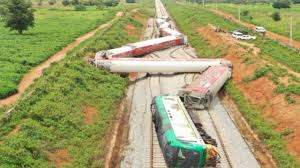The Nigerian Safety Investigation Bureau (NSIB) has identified poor infrastructure maintenance and operational lapses as the major causes of the Abuja-Kaduna train derailment that happened on August 26, 2025.
The Bureau’s preliminary report, released on Wednesday, differs from the earlier explanation given by the Nigeria Railway Corporation (NRC) and sheds light on deeper systemic failures in the country’s rail operations.
According to the NSIB, 21 passengers sustained injuries of varying degrees, not 20 as initially reported by the NRC. Luckily, no deaths were recorded. Injured passengers were given first aid before being taken to hospitals for further treatment.
The accident involved NRC’s train number AK1, powered by locomotive CDD5c2 2701. It derailed around 11 am at the Asham section of the Abuja-Kaduna corridor. The derailment caused some carriages to overturn, sending terrified passengers running for safety. Eyewitnesses said the scene was chaotic, with some initially fearing it was another terrorist attack before realising it was an accident.
Immediately after the incident, the NRC attributed the derailment to human error, excessive speeding, and wrong use of the emergency brake. But the NSIB’s preliminary findings pointed in another direction.
The report revealed that the derailment was caused by neglected infrastructure, including a broken point clip and an unserviceable automatic switch mechanism at Asham Station. With the equipment not working, railway workers had to manually operate and lock the switch, a risky procedure that created the conditions for the derailment.
As the train passed through the faulty section, the front coaches began shaking violently before derailing. The incident damaged over 300 sleepers, destroyed hundreds of track fasteners, and affected parts of the signalling system.
The NSIB noted that the problem was not new. The same section had witnessed a derailment just 13 months earlier. Instead of full replacement of the damaged sleepers at the time, only surface-level repairs were done. “The occurrence was the second derailment at Asham Station within 13 months. Some sleepers damaged in the previous incident were only patched, rather than being properly replaced,” the report stated.
The Bureau also highlighted operational gaps in the NRC. Staff had received only initial training and had not undergone refresher courses. In addition, important operational and safety tools such as OEM spare parts, CCTV cameras, clocks, and communication devices were either unavailable or abandoned in poor condition.
According to the NSIB, these shortcomings left NRC staff unprepared to manage risks effectively. On the day of the derailment, the shunter cleared the train to proceed manually despite the faulty switch. This decision, combined with neglected infrastructure, resulted in a derailment that has once again dented public confidence in rail services.
The Bureau’s report further noted that some passengers were evacuated without being treated at local health facilities, a gap in emergency response that raised more concerns.
To prevent future derailments, the NSIB issued safety recommendations. These include immediate replacement of all derailment-affected sleepers, replacement of all point switches at Asham and other parts of the corridor with genuine OEM parts, and urgent repairs of all caution zones along the route.
The Bureau also recommended regular refresher training for NRC staff, restoration of defective monitoring and communication equipment such as CCTV systems and clocks, and improvements in signalling infrastructure.
The Director of Public Affairs and Family Assistance at NSIB, Mr. Bimbo Oladeji, explained that the report was preliminary and subject to further review. “The final report will present detailed conclusions and additional recommendations to enhance rail safety in Nigeria,” he said.
Oladeji added that the Bureau remains committed to thorough investigations that address not just immediate causes but also systemic weaknesses that threaten rail safety.
The Abuja-Kaduna rail line is one of the country’s most strategic transport links, moving thousands of passengers daily. However, it has been plagued by insecurity, vandalism, and now repeated derailments. The August derailment revived fears among passengers who still recall the 2022 attack on the same route.
Transport analysts warn that if urgent reforms are not implemented, the NRC risks losing public trust. They stress that Nigeria’s ambition to expand its rail network cannot succeed without strong investment in safety and modern infrastructure.
While it is a relief that no lives were lost in the latest derailment, the injuries to 21 passengers highlight the risks of systemic neglect. Experts insist that for rail to be a reliable alternative for mass transit, maintenance must be consistent, equipment must meet international standards, and staff must be regularly trained.
The NSIB is expected to release its final report in the coming months with more detailed recommendations. Until then, Nigerians continue to demand urgent reforms to restore confidence in the nation’s railway system.
